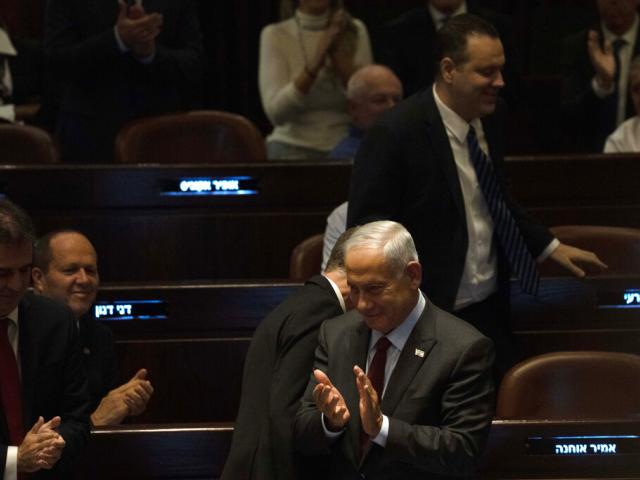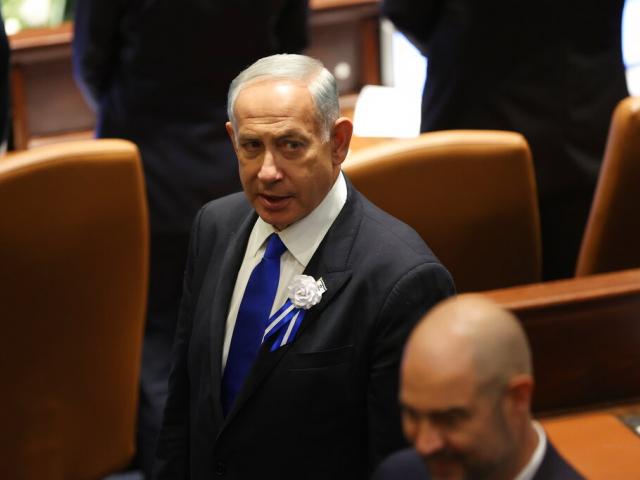JERUSALEM, Israel – Prime Minister Benjamin Netanyahu has begun his sixth term in office. Israel’s 37th government was sworn in Thursday morning in Jerusalem, amid raucous protests from opposition Knesset members and hundreds of demonstrators outside. After he spoke about his government’s priorities, which included preventing a nuclear Iran’s threat to Israel, Netanyahu was shouted down. “Knesset members, I don’t have to hear your shouts to know we have some disagreements,” he responded, “but some things we agree upon.”
“Losing elections isn’t the end of democracy – it’s the essence of democracy,” he said.
At the top of the new coalition’s platform is a controversial goal to expand the Jewish presence throughout the country, including the biblical lands of Judea and Samaria, known to the world as the West Bank, which is considered “occupied” territory by many nations.
The prime minister finalized agreements this week with religious party leaders in his government, then his Likud Party issued a policy statement Wednesday, saying the new coalition would “advance and develop settlement in all parts of the land of Israel – in the Galilee, Negev, Golan Heights, and Judea and Samaria.”
The statement has caused concern in Washington, at the United Nations in New York and at the European headquarters in Brussels, where the two-state solution between Israel and the Palestinians is still the preferred (and only) diplomatic track.
Alex Traiman, Jerusalem bureau chief of Jerusalem News Syndicate, believes the new Israeli government is expressing the will of the voters.
“I think it’s good that the coalition platform is created from the beginning and everybody understands what this government stands for, which is very much in line with what the voters for this right-wing government stand for,” Traiman told CBN News.
Most of the world considers the West Bank settlements, where more than a half million Jews live, to be illegal. Most Israelis believe they have the right to live there under international laws and accords signed both before and after the 1967 Six-Day War, when Israel won all the territories mentioned in the new government’s platform, along with the Gaza Strip and a large part of the Sinai Peninsula, in battle.
Traiman noted that without interference from Washington, even more Israelis would live in Jewish communities on the West Bank
“Particularly in regard to settlements in previous administrations in the United States, Netanyahu was forced actually to limit building in the settlements, the Jewish communities in Judea and Samaria, commonly known as the West Bank,” Traiman said, and added that “Israel, as Netanyahu said in the coalition agreement, says it has exclusive rights to all the land within the Land of Israel, including Judea and Samaria.”
The new government was elected, in part, to promote just such an expansion, and also to quell Palestinian violence, which has raged on and off for most of the past year.
Oded Revivi, mayor of the Judean city of Efrat, said, “I think there’s a lot of misunderstanding. First of all, we have to realize that the government that has been formed has been chosen in a democratic system, that a majority of the people of Israel wanted to see a change from the previous government.”
Members of the outgoing government, including Former Prime Minister Yair Lapid, are unhappy with some of the Netanyahu policy changes and appointments, including Itamar Ben-Gvir as the newly-created National Security Minister.
Revivi cautions against judging the new government before it gets started, and believes the members of Netanyahu’s coalition are already tempering their stands.
“I think people need to remember in a nutshell that politicians, they campaign for their base but they govern for the people. And once they sit on the chair of the minister or the chair of power, they understand that there are limits to the power, and there’s also some compromises that need to be made in order to actually move forward,” Revivi said.
The new government might also stand to benefit from sustained media attacks, which have been months in the making, along with heavy criticism from foreign governments. The expectations for this Netanyahu coalition have been set so low that any advances toward peace or security may be well-received by the Israeli public.
In his final day as prime minister, Lapid said he is leaving the office with “an unquiet heart.” In a farewell Facebook post, he wrote, “This isn’t the end, this is the beginning of the struggle for our beloved country. We are fighting for the future of our kids and we won’t stop until we topple the government of destruction, and return.”
***As the number of voices facing big-tech censorship continues to grow, please sign up for Faithwire’s daily newsletter and download the CBN News app to stay up-to-date with the latest news from a distinctly Christian perspective.***




